Month: April 2022
Sunday Poem
How can we kill them—they look like us.
………………….…………—soldier in Ukraine
Calling Home
An old man, who limped like uncle Alexi, stumbled,
and we shot him. He had a gun, yes, but he wore a cap
like the one you knit for me. One wore a coat like father’s,
he tumbled off a bridge into the river. When I shot one running
into the forest, his hands flew up like brother Oleg, twitching.
I remember grandfather Sasha shouting when he was disturbed
too early, before his tea. Here a greybeard shouted as we passed,
and my commander shot him on his doorstep. One my age, when
he was hit, cried out “Arina!” Who will have to tell her? If I die,
who will tell you? I can’t sleep. I see these faces everywhere.
When my gun is cold, I am afraid. When it is hot, I am ashamed.
What will happen to children here, like our Slava, Vasyl, Ksenia?
And if I live, after I have a hero’s welcome, tell me, mother,
after you hold me in your arms, what will happen to me?
by Kim Stafford
—from Rattle Magazine, Poets Respond, March 5, 2022
‘Picasso Volume IV’ by John Richardson
Peter Conrad at The Guardian:
 John Richardson’s serial biography of Picasso stalled when Richardson died three years ago at the age of 95. After this hiatus it now resumes, but in a different mood. The first three volumes were triumphalist, emphasising Picasso’s victorious advance from Barcelona to Paris and the X-ray vision that enabled him to fracture reality and modernise the visual world. In the fourth volume, with Europe caving in to fascism and Spain convulsed by civil war, the surrealist Michel Leiris sets the agenda with a baleful warning. “Picasso,” Leiris announced in 1937, “sends us our letter of doom.”
John Richardson’s serial biography of Picasso stalled when Richardson died three years ago at the age of 95. After this hiatus it now resumes, but in a different mood. The first three volumes were triumphalist, emphasising Picasso’s victorious advance from Barcelona to Paris and the X-ray vision that enabled him to fracture reality and modernise the visual world. In the fourth volume, with Europe caving in to fascism and Spain convulsed by civil war, the surrealist Michel Leiris sets the agenda with a baleful warning. “Picasso,” Leiris announced in 1937, “sends us our letter of doom.”
That declaration refers to Guernica, Picasso’s panorama of the bombed Basque town, where distraught civilians and gutted animals writhe under a radioactive monochrome sun while in the corner a villager’s emergency trip to empty her bowels in an outhouse exposes what Picasso called “the most primitive effect of fear”.
more here.
Keiron Pim on Joseph Roth
Joseph Roth’s 1924 novel “Rebellion” Reborn
John Williams at the NYT:
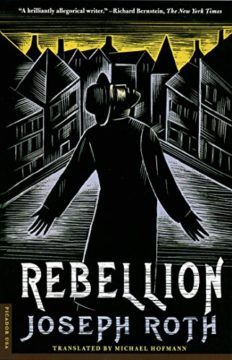 Roth’s most securely canonical work is “The Radetzky March,” a sweeping novel about the end of the Austro-Hungarian Empire. “Rebellion,” like his “Job,” another fable-inflected novel about faith and disillusionment, seems more modest at first glance but is profound and worthy of enduring. Andreas’s naïveté and eventual enlightenment might have been cartoonish in the hands of someone less ironic and wise than Roth. Instead, he is sympathetic as well as comical, and his closing cri de coeur against God is one for the ages.
Roth’s most securely canonical work is “The Radetzky March,” a sweeping novel about the end of the Austro-Hungarian Empire. “Rebellion,” like his “Job,” another fable-inflected novel about faith and disillusionment, seems more modest at first glance but is profound and worthy of enduring. Andreas’s naïveté and eventual enlightenment might have been cartoonish in the hands of someone less ironic and wise than Roth. Instead, he is sympathetic as well as comical, and his closing cri de coeur against God is one for the ages.
“Rebellion,” which had regrettably been out of print, was recently reissued by Everyman’s Library, in time to coincide with the Irish writer Hugo Hamilton’s latest novel, “The Pages.” Hamilton’s book is narrated by a first edition of Roth’s novel.
more here.
Two Heads
Rachel Cooke in The Guardian:
 This extraordinary comic is a collaboration between the neuroscientists Uta and Chris Frith, their writer son, Alex, and the artist and graphic novelist Daniel Locke. Have I ever read anything like it before? No, I’m certain that I haven’t. Each page is a visual delight: as colourful and as joyful as a book for children. It’s extremely easy to read and often very funny. And yet you finish it with your mind blown. Simply by virtue of the fact that it makes some pretty cutting-edge brain science seem almost straightforward, it subtly expands the world of the reader. Afterwards, I wasn’t only more attentive to my own thought processes (hmm, I thought, as I watched my hand reach for the bottle of sauvignon); armed with a bit more insight into the way people around me might be thinking, it’s possible that it may also have liberated me, just a little, from some all too human anxieties (what are they thinking? Doesn’t she like me? Why hasn’t he called me?).
This extraordinary comic is a collaboration between the neuroscientists Uta and Chris Frith, their writer son, Alex, and the artist and graphic novelist Daniel Locke. Have I ever read anything like it before? No, I’m certain that I haven’t. Each page is a visual delight: as colourful and as joyful as a book for children. It’s extremely easy to read and often very funny. And yet you finish it with your mind blown. Simply by virtue of the fact that it makes some pretty cutting-edge brain science seem almost straightforward, it subtly expands the world of the reader. Afterwards, I wasn’t only more attentive to my own thought processes (hmm, I thought, as I watched my hand reach for the bottle of sauvignon); armed with a bit more insight into the way people around me might be thinking, it’s possible that it may also have liberated me, just a little, from some all too human anxieties (what are they thinking? Doesn’t she like me? Why hasn’t he called me?).
Uta Frith, an emeritus professor of cognitive development at the Institute of Cognitive Neuroscience at University College London, and Chris Frith, emeritus professor at the Wellcome Trust Centre for Neuroimaging at University College London, are not only two of the most distinguished academics in Britain; they have also been married for 50 years.
More here.
Saturday Poem
The Wars Between the Wars Between the Borders that Were Not There
You had to know how bad the Nazis were
to have loved the Communists. In 1946,
in that nightmare time on earth, in that place
between the wars between the borders
that were not there, you couldn’t know
who would be more brutal,
you had to take your chances, guess —
If someone came knocking in the night
it could be your neighbor, your enemy.
It could be a soldier come for your daughter
or for your wife, or only bread.
Now, who could betray you,
who would betray you,
on which side should you stand?
There was no safe place to stand.
Some stood in lines and froze to death.
Some marched where they were told to march.
Some set their houses and fields on fire
then fled to the forest and buried themselves.
Many disappeared in this way,
the earth a shallow grave,
the earth turned over, leaking bones.
So, who were the martyrs,
who were the killers,
who was a partisan, your kind?
If you had to choose between blood and water,
there was no human way to choose.
Then, what had been wasted,
what had been ruined
when it was over,
what had you saved?
And if you were far from the burning fields
in a country that made you a criminal,
what made you more or less alive
than the dead of the country you’d left behind?
So, you took the cash that was handed to you,
you changed your name,
you changed your clothes.
What I mean to say is that I forgive you
whatever deal with the devil you made.
I have never gone hungry
except from spite,
never lifted a dead child in my arms.
I have never had to kill a thing I loved
to not be killed.
Listen, I don’t know who you were
but there was a world and you stood in it, once,
then you fell through the door of yourself.
by Cecilia Woloch
from Plume Magazine
Murder in the Mohalla: Aamina Ahmad’s stunning debut novel
Omar El Akkad in The New York Times:
 The vacuum where consequences should be is the setting of Aamina Ahmad’s quietly stunning debut novel, “The Return of Faraz Ali” — stunning not only on account of the writer’s talent, of which there is clearly plenty, but also in its humanity, in how a book this unflinching in its depiction of class and institutional injustice can still feel so tender.
The vacuum where consequences should be is the setting of Aamina Ahmad’s quietly stunning debut novel, “The Return of Faraz Ali” — stunning not only on account of the writer’s talent, of which there is clearly plenty, but also in its humanity, in how a book this unflinching in its depiction of class and institutional injustice can still feel so tender.
At the line level, Ahmad has a habit of wielding softness against the most grotesque scenes, giving them an intimacy anything louder would likely wash out. Early on in the story, while trying to quash a protest, Ali beats one of the young demonstrators to a pulp: “There was relief in the way the boy’s face opened up to him, its contours, its ridges caving in so easily, as if he wanted nothing more than this, as if he were being freed.”
Ahmad’s compassion and deep care for the psychological and emotional nuances of her characters never wavers, no matter how monstrous or self-interested or defeated they become. It remains as Ali suffers the punishment for refusing to follow orders: exile to eastern Pakistan on the eve of Bangladeshi independence, his bright career prospects snuffed. It remains as Ali’s sister, Rozina, once a diva of some renown, navigates the barrenness of life out of the spotlight. It extends through generations and transformations of place, all the way to a devastating final chapter, fully human, fully engaged with what makes us human, no matter the size of the wounds or the immunity of those who inflict them. The powerful might often escape consequences, Ahmad shows, but life without these is its own kind of poverty, its own miserable inheritance.
More here.
Justin E. H. Smith and S. Abbas Raza speak about Friendship
From The Point magazine:
On this episode of “What Is X?” Justin E.H. Smith asks: What is friendship? His guest, S. Abbas Raza, is the founding editor of 3 Quarks Daily and has a graduate degree in philosophy from Columbia, but what qualifies him as an expert on this topic is quite simple: he is one of Justin’s oldest friends. Together, the two settle into a relaxed conversation on the nature of friendship—once a high priority for the ancient philosophers, and yet strangely neglected today—and take their own as something of a case study, probing its start in the mid-Nineties, its roots in the cultural differences between American and Pakistani conceptions of friendship, and how it has changed over time. From there they progress to timeless questions: Can you have too many friends? Is there really a distinction between the “true friend” and the “fair-weather friend”? Does the classic “Friendship ended with Mudasir” meme bear witness to a kind of relationship that simply does not exist in the U.S.? And most pressingly of all: Is friendship overrated?
A Conversation About Witches And Feminism
Sarah Moroz with Mona Chollet at Bookforum:
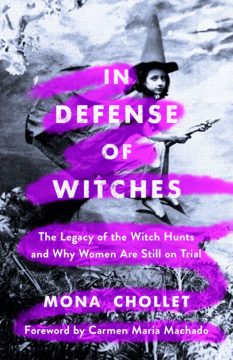 I’m almost fifty, and over the course of my adult life, the evolution has already been amazing. I grew up in a world where feminists were just a few strange women, always mad, and not to be trusted. Feminism was so unpopular. Now, it’s extraordinary the way young women behave—they don’t want to please men at all costs—and I admire that very much. I was raised to please men and be an “acceptable” woman, to not be angry, or too demanding. I see how young women push that, and push men to evolve and understand things about them. This social blackmail—that if you’re not a “nice” girl, you’ll never be loved—today, they don’t care! My hope is that men will be forced to evolve and be interested in women’s experiences. But it’s a big struggle. In France, I’m really struck by the violent reaction against this. Many men are resisting this evolution with all their strength, because they’ve been living in a world that is so comfortable. It’s really about including your experience of the other in your vision of the world. And many men are not willing to do that.
I’m almost fifty, and over the course of my adult life, the evolution has already been amazing. I grew up in a world where feminists were just a few strange women, always mad, and not to be trusted. Feminism was so unpopular. Now, it’s extraordinary the way young women behave—they don’t want to please men at all costs—and I admire that very much. I was raised to please men and be an “acceptable” woman, to not be angry, or too demanding. I see how young women push that, and push men to evolve and understand things about them. This social blackmail—that if you’re not a “nice” girl, you’ll never be loved—today, they don’t care! My hope is that men will be forced to evolve and be interested in women’s experiences. But it’s a big struggle. In France, I’m really struck by the violent reaction against this. Many men are resisting this evolution with all their strength, because they’ve been living in a world that is so comfortable. It’s really about including your experience of the other in your vision of the world. And many men are not willing to do that.
more here.
In Defense Of Witches With Mona Chollet And Gloria Steinem
Can Technology Shape Our dreams?
Michael W. Clune at Harper’s Magazine:
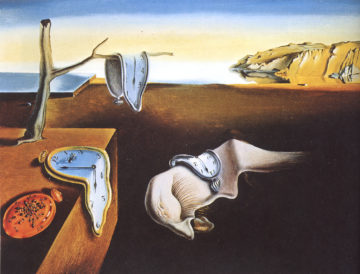 Despite some intriguing speculation, scientists haven’t yet come up with a clear, satisfying answer to the question of why we dream. Part of the reason is doubtless because, as any time spent studying neuroscience will show you, our knowledge of the brain is in its infancy. And part of it is due to the special limitations of dream research. Animal studies—sometimes referred to as the gold standard of neuroscientific research (think of the things one can do to rat brains that one can’t do to humans)—are of no help here. Like many pet owners, I believe that my dog dreams. But when I see her lying on the couch, muttering and growling with her eyes moving behind closed lids, I can’t wake her and ask her what she saw. When I spoke about the state of the field with the dream researcher Erin Wamsley, she described a kind of disappointment, a sense that the breakthrough insights into the nature of dreaming that seemed imminent a decade or two ago haven’t materialized.
Despite some intriguing speculation, scientists haven’t yet come up with a clear, satisfying answer to the question of why we dream. Part of the reason is doubtless because, as any time spent studying neuroscience will show you, our knowledge of the brain is in its infancy. And part of it is due to the special limitations of dream research. Animal studies—sometimes referred to as the gold standard of neuroscientific research (think of the things one can do to rat brains that one can’t do to humans)—are of no help here. Like many pet owners, I believe that my dog dreams. But when I see her lying on the couch, muttering and growling with her eyes moving behind closed lids, I can’t wake her and ask her what she saw. When I spoke about the state of the field with the dream researcher Erin Wamsley, she described a kind of disappointment, a sense that the breakthrough insights into the nature of dreaming that seemed imminent a decade or two ago haven’t materialized.
more here.
Magritte’s Prophetic Surrealism
Jackson Arn in the Boston Review:
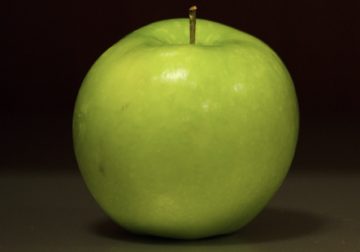 While I was reading Magritte: A Life, I started to notice apples everywhere. I’d be on the train, learning about The Son of Man—the 1964 portrait of a bowler-hatted man whose face is masked by a floating green apple—and the woman sitting across from me would be wearing a T-shirt with a reproduction of same painting. Or I’d be in a café and someone a few seats away would be eating an apple in an identical shade of cat’s-eye green. I’d take notes on my laptop and catch a glimpse of the glowing apple on the back. The world suddenly seemed full of apples. This wasn’t an epiphany; it felt smaller and stranger, an itch I couldn’t quite scratch—in a word, Magritte.
While I was reading Magritte: A Life, I started to notice apples everywhere. I’d be on the train, learning about The Son of Man—the 1964 portrait of a bowler-hatted man whose face is masked by a floating green apple—and the woman sitting across from me would be wearing a T-shirt with a reproduction of same painting. Or I’d be in a café and someone a few seats away would be eating an apple in an identical shade of cat’s-eye green. I’d take notes on my laptop and catch a glimpse of the glowing apple on the back. The world suddenly seemed full of apples. This wasn’t an epiphany; it felt smaller and stranger, an itch I couldn’t quite scratch—in a word, Magritte.
René François Ghislain Magritte: born 1898, died 1967; noted fan of bowler hats and pipes; creator of some 1,100 oil paintings and another 850 works on paper, many of which now seem kitschy or lazily repetitive; and yet, I suspect, the twentieth-century artist whose work best anticipated the texture and tenor of life in the twenty-first.
More here.
The IPCC Report and “The Physics of Climate Change”
Lawrence M. Krauss in Critical Mass:
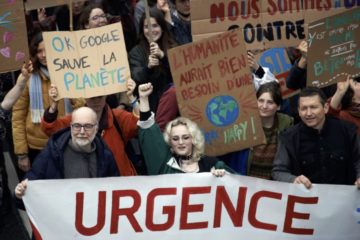 The newest Intergovernmental Panel on Climate Change’s (IPCC) Sixth Assessment Report released in late February paints a bleak picture of the global and local effects of climate change in coming decades, and of the challenges that governments and citizens face as they work to address the problems that will arise due to human induced global warming.
The newest Intergovernmental Panel on Climate Change’s (IPCC) Sixth Assessment Report released in late February paints a bleak picture of the global and local effects of climate change in coming decades, and of the challenges that governments and citizens face as they work to address the problems that will arise due to human induced global warming.
Have things changed dramatically since I published “The Physics of Climate Change” last year at this time? Not really. Just a clearer sense of current issues, and a clearer statement of what needs to be done and the challenge of doing it.
The key points are pretty clear.
(1) We are dumping about 10 billion tons of carbon into the atmosphere each year, about 50% of which will remain there for a millennium.
More here.
Anne Applebaum and Yascha Mounk discuss Putin’s sputtering war effort
Yascha Mounk in Persuasion:
Yascha Mounk: It’s been a month since the beginning of the war. What is the state of war today, and how is that different from what we might have expected four weeks ago?
 Anne Applebaum: We know exactly what the Russians expected four weeks ago. We know because the US Defense Department had a leak of some kind. There was a very specific battle plan, which involved the taking of Kiev in three to four days, and then the conquest of all of Ukraine (including Western Ukraine, all the way up to the Polish border) within four to six weeks. We know that after three or four days, already there were articles written celebrating the conquest of Ukraine and the reunification of Russia, Belarus and Ukraine, one of which accidentally appeared on a Russian website and was quickly taken down. So we know what the plan was. And I have to say that that was also what most American analysts thought would happen.
Anne Applebaum: We know exactly what the Russians expected four weeks ago. We know because the US Defense Department had a leak of some kind. There was a very specific battle plan, which involved the taking of Kiev in three to four days, and then the conquest of all of Ukraine (including Western Ukraine, all the way up to the Polish border) within four to six weeks. We know that after three or four days, already there were articles written celebrating the conquest of Ukraine and the reunification of Russia, Belarus and Ukraine, one of which accidentally appeared on a Russian website and was quickly taken down. So we know what the plan was. And I have to say that that was also what most American analysts thought would happen.
More here.
A YouTube channel is transforming a remote village in Bangladesh
More here.
Friday Poem
My Sister Teaches Me How to Ululate
Yallah habibti, move your tongue like the sea
easy. My big sister teaches me to ululate, rolls
her tongue in waves. Dips thin fingers inside
my mouth to pull out mine, stretches it long
and pinches the tip. Watch, we move tongues
like this. I see the walls of our father’s house
collapse and we swim free leleleleleleleleleee
On the ferry to Tangier I shriek across the sea.
Practice how to sound like a real woman. Old
aunties grab my buttocks, smush their breasts
against my back and sing leleleleleleleleleleee
eeeeeeeeeeeeeeeeeeeeeeeeeeeeeeeeeeeeeeeeeeeeeeee
Don’t cover your mouth habibti! Only women
on the upper deck, only sea. We move tongues
like this to tell the waves stay back, tell men
stay back, tell the dead stay gone, tell runaway
wives stay gone. They turn me into wisteria
woman, limbs wrapped around poles and thighs
as they guide me. Throw back your head, epiglottis
to the breeze. Salt air burns my hot membranes,
scratches at the tight knots of my chords.
All my life I was told
women must swallow sand
unless we are sounding
a warning.
The British Empire Was Much Worse Than You Realize
Sunil Khilnani in The New Yorker:
 At the height of the British Empire, just after the First World War, an island smaller than Kansas controlled roughly a quarter of the world’s population and landmass. To the architects of this colossus, the largest empire in history, each conquest was a moral achievement. Imperial tutelage, often imparted through the barrel of an Enfield, was delivering benighted peoples from the errors of their ways—child marriage, widow immolation, headhunting. Among the edifiers was a Devonshire-born rector’s son named Henry Hugh Tudor. Hughie, as he was known to Winston Churchill and his other chums, pops up so reliably in colonial outposts with outsized body counts that his story can seem a “Where’s Waldo?” of empire.
At the height of the British Empire, just after the First World War, an island smaller than Kansas controlled roughly a quarter of the world’s population and landmass. To the architects of this colossus, the largest empire in history, each conquest was a moral achievement. Imperial tutelage, often imparted through the barrel of an Enfield, was delivering benighted peoples from the errors of their ways—child marriage, widow immolation, headhunting. Among the edifiers was a Devonshire-born rector’s son named Henry Hugh Tudor. Hughie, as he was known to Winston Churchill and his other chums, pops up so reliably in colonial outposts with outsized body counts that his story can seem a “Where’s Waldo?” of empire.
He’s Churchill’s garrison-mate in Bangalore in 1895—a time of “messes and barbarism,” the future Prime Minister complained in a note to his mum. As the century turns, Tudor is battling Boers on the veldt; then it’s back to India, and on to occupied Egypt. Following a decorated stint as a smoke-screen artist in the trenches of the First World War, he’s in command of a gendarmerie, nicknamed Tudor’s Toughs, that opens fire in a Dublin stadium in 1920—an assault during a search for I.R.A. assassins which leaves dozens of civilians dead or wounded. Prime Minister David Lloyd George delights in rumors that Tudor’s Toughs were killing two Sinn Féinners for every murdered loyalist. Later, even the military’s chief of staff marvelled at how nonchalantly the men spoke of those killings, tallying them up as though they were runs in a cricket match; Tudor and his “scallywags” were out of control. It didn’t matter: Churchill, soon to be Secretary of State for the Colonies, had Tudor’s back.
More here.
The Hyperbole and Horror of Ginni Thomas
Frank Bruni in The New York Times:
 A week has gone by and I’m still aghast. Still astonished. Still absorbing what Ginni Thomas said in those text messages to Mark Meadows, President Donald Trump’s chief of staff, as she urged him to overturn the 2020 election, and what she apparently believes in her poisoned mind. So let’s please, please move past Will Smith and the deconstruction of that ugly incident and reallocate our attention to her behavior. It has broader and more profound consequences. It also explains why, despite my efforts not to, I sometimes feel almost hopeless about this country’s present and future.
A week has gone by and I’m still aghast. Still astonished. Still absorbing what Ginni Thomas said in those text messages to Mark Meadows, President Donald Trump’s chief of staff, as she urged him to overturn the 2020 election, and what she apparently believes in her poisoned mind. So let’s please, please move past Will Smith and the deconstruction of that ugly incident and reallocate our attention to her behavior. It has broader and more profound consequences. It also explains why, despite my efforts not to, I sometimes feel almost hopeless about this country’s present and future.
“Help This Great President stand firm, Mark!!!” Thomas wrote to Meadows in the days following the election, her derangement and despair wrought in a bonanza of exclamation points. “You are the leader, with him, who is standing for America’s constitutional governance at the precipice.” The precipice! I should haul out a few extra exclamation points myself, especially because Thomas went on to say that she and Meadows were watching “the Left” attempt “the greatest Heist of our History.”
